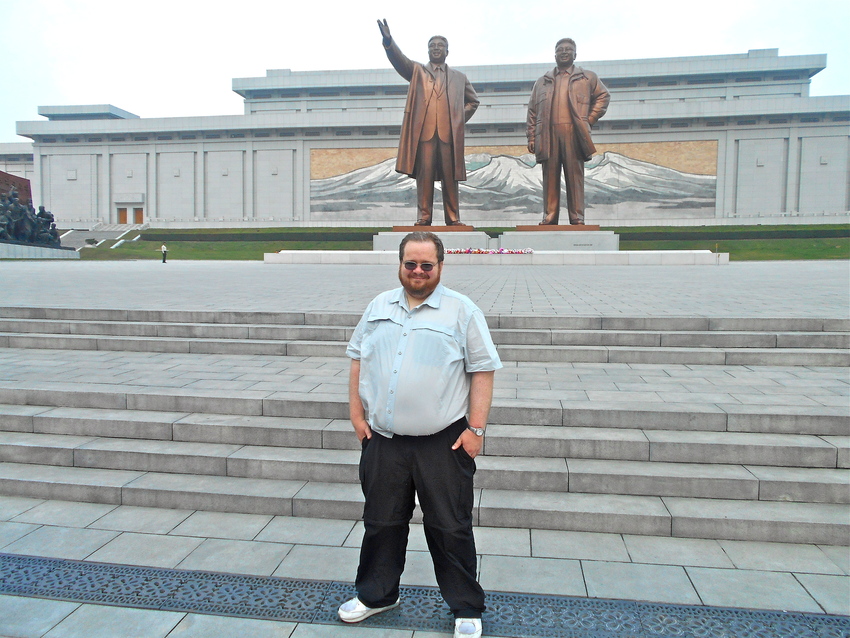Bradley Boswell has visited about 70 countries, including some of the world’s most forbidding places—Iraq, Iran, Syria and Pakistan. But his recent trip to North Korea was a unique experience.
"North Korea was the most bizarre place I’ve ever been to and probably the most bizarre place I’ll ever go to," said Boswell, a Longwood University Spanish lecturer who spent five days there in early June.
"I wanted to experience what the novel 1984 is like. It was the first time I’d experienced it in person. I’m glad I went once. I don’t think I’ll ever do it again. I’ve had my fill of North Korea. It’s a mind-bender, and I’m still not sure what to make of it.
"There was constant propaganda on our tour—‘American dog’ this, ‘American dog’ that—which got old. This was the most blatant propaganda of any place I’ve ever visited."
Boswell was one of about 25 people, and four Americans, on the trip. It was arranged by Young Pioneer Tours (YPT), a China-based company founded by a British expatriate who specializes in North Korea.
"Young Pioneers appeals to experienced travelers, those who don’t do stupid things," said Boswell, a self-described lover of "ancient history and adventure" who began seeing the world in earnest in 2004. "For five days, it was more expensive than most of my trips [about $1,300 excluding his airfare to and from China], but they jammed a lot in, and it was actually quite reasonable for a trip to North Korea. We toured like crazy for three days. Every night we were exhausted."
Getting there was something of an adventure. Boswell had to wire money from his bank to a bank in China where YPT has an account, email a pdf scan of his passport and meet the tour group at a hostel in Beijing, where he was given a visa (which was confiscated when he left North Korea).
He then flew from Beijing to the airport in Pyongyang, North Korea’s capital. Americans are required to enter North Korea by plane; non-Americans may enter by plane or train, said Boswell. The U.S. State Department strongly encourages Americans not to visit the country, whose intensely secretive regime is known for its hardline communist propaganda and human rights abuses.
"Visiting North Korea is easy if you plan three or four months ahead," Boswell said.
Tourists in North Korea must be accompanied by at least two "minders" and usually are also joined, at least some of the time, by a "guide," typically a Westerner who helps the tour run smoothly. Boswell’s guide was a native Australian living in Beijing who works for YPT. He had three minders, who accompanied the group as it traveled by bus, with one of the minders, a woman, doing most of the talking as they visited various sites. The bus driver also was a North Korean.
"On these tours in North Korea, it’s best if you nod your head and say ‘OK’ for three or four days," Boswell said. "Being respectful of another culture while you are visiting another country will keep you alive and safe."
That’s what he did when he stayed on the bus one afternoon after everyone else had gone into a bar. One of the minders, who had learned that Boswell teaches at a university, told him he should try to spread North Korea’s Juche political philosophy, also called Kimilsungism (after North Korean founder Kim Il-sung), upon returning home. "I just politely listened to him for 10 or 15 minutes," he said.
Most of Boswell’s time was spent in Pyongyang, which he described as "very orderly. There are cars but hardly any traffic. Very few people have cars. Everyone gets around by bicycle, foot or public transportation. It’s not a bustling city. Policewomen direct traffic, and they sell figurines of them in stores. They salute when someone important comes by. They can tell if it’s someone important by the color of the license plate."
In his hotel, he was surprised to see two Christmas trees in the basement—North Korea is rigorously atheistic—and to get the BBC in his room. "I’m sure our hotel room was bugged. The trip was very much regulated. You couldn’t have any one-on-one interaction with people on the street."
In a museum devoted to the Korean War of 1950-53, which pitted North Korea against a United Nations coalition, Boswell saw wax figures of dead U.S. soldiers being "picked over by ravens" and was told the North Koreans killed a million American "imperialists." The actual figure of U.S. battle deaths was 33,686.
Boswell also visited the DMZ—the tense buffer zone between the two Koreas—and the U.S.S. Pueblo, the U.S. Navy ship boarded and captured by the North Koreans in 1968, now a museum.
Based on his parents’ reaction to a previous trip, Boswell didn’t tell them about this one beforehand. "When I told my parents I was going to Turkey and Egypt in 2004, my mom said, ‘I’ll pray for you’; my dad said he wasn’t happy about it. I didn’t tell them before I went to North Korea or Iraq [for 16 days in May 2013] because I didn’t want it to be tough on their health."
Boswell still wants to see some countries shunned by most Americans, including Yemen and Libya. "I’m attracted like a moth to a flame when it comes to ancient things. I enjoy seeing places that other people haven’t been to. I tell my students to get outside their comfort zone."
Any advice for someone visiting North Korea? "I would tell them to mentally prepare for the propaganda, which is stressful, but if you’re curious and want to see what’s going on there—at least what the government is willing to show you—go ahead and do it. It’ll be the safest trip you’ll ever take, as long as you’re respectful, don’t take a Bible and keep your mouth shut about politics."



Leave a Comment